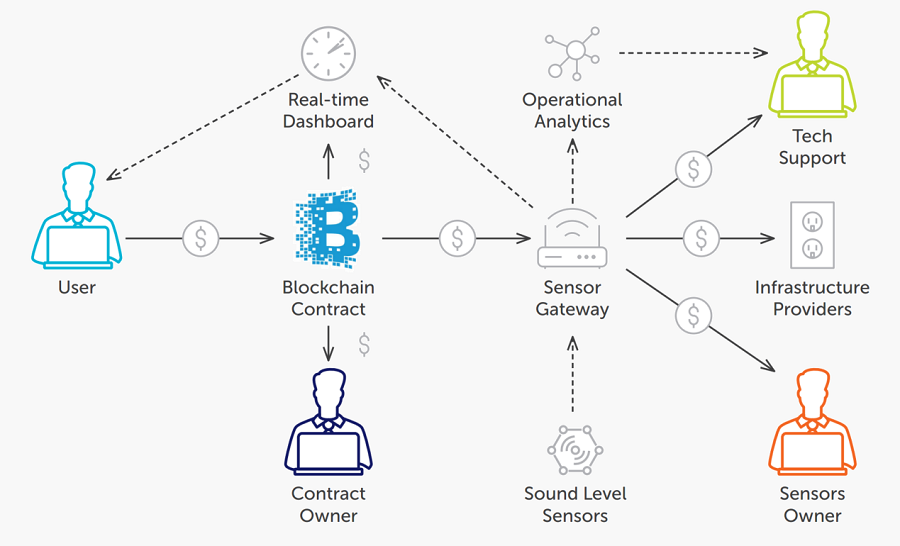The demonstration was shown during the conference as an interactive case just during the speakers’ presentation.
Business Challenge
Businesses that use smart devices in distributed networks for a specific purpose (e.g. financial institutions/treasures/medical/high historic value objects etc.) encounter the significant pressure of maintaining the infrastructure and managing a system of infinite, valuable data—and securely.
One valuable way to manage it is through merging IoT and blockchain.
IoT and blockchain can be securely leveraged through any kind of data collection—written data, voice data, biometric data, etc. These data, sensed through IoT devices help businesses to detect changes and create valuable reports based on those changes, applying them to decision-making. IoT is the vehicle through which the data is sensed, and blockchain creates a safe environment for it to be stored and transferred.
There are numerous different types of data for which these principles can be applied. In this example, SoftServe used sensors to collect sound data on the loudness of applause while presenting during the conference itself. In a real-life application, measuring sound and collecting its data could be used to detect the efficiency of equipment in industrial businesses (e.g. detecting types and levels of noise within the Large Hadron Collider’s infrastructure, metallurgy, or even mining farms).
Project Description
The demonstration case put together for the audience at Carnegie Melon was based on measuring their reaction to different speakers at the conference by analyzing the character and noise level of applause in real time. Sensors were placed in different areas inside the presenting room.
To run this specific case, the SoftServe Big Data and IoT team team developed our own blockchain environment to run the interactions among system parties.
The main parties included in the system are:
- End users: Those interested in reports that are compiled based on the collected data, ready to buy the information
- Sensor gateway:In this specific case sound sensors were used, but any sensors collecting data
- Sensors’ owner: The company that operates the sensors
- Infrastructure maintenance: A tech support operator
- Utilities providers: Outside factors such as electricity, water, etc.
The system is distributed, and therefore has no central point of authority (independent) nor any single point of failure. In the event that any party falls off the interaction, it can easily be substituted by another at any moment afterwards without losing important data or affecting system performance for the time of absence.
The interaction process between parties is described in the picture bellow:

Every party in this system is an autonomous business unit, able to pay for all interactions needed or services received, and able to get paid for services provided.
The billing module is also included. Blockchain contracts enforce payment withdrawals and transfers. Sensors collect data from the environment, sell it to the user, and transfer received payment to tech support or infrastructure providers to pay for utilities and extra services. The profit is transferred to the sensors’ owner.
The main benefit is that system is:
- Easily scalable
- Independent; does not need a central point for maintenance and authority
- Resilient in having no single point of failure
- Cost efficient
Value Delivered
The system provides benefits to all involved pa rties:
- End User: Gets timely, guaranteed, and transparent data reports without needing to monitor the billing process or manage invoices due to the automated money withdrawal via the smart contracts.
- Sensors Owner: No need to manage the system performance directly and maintaining infrastructure, easiness of invoicing, guarantee of payments, and ability to scale the business easily.
- Infrastructure/Service Providers: Receive transparent, timely and guaranteed payments by smart contracts for services provided.
The system is developed to fit different types of businesses and customized to fit specific client’s needs. It is a universal environment to embrace various types of sensors, data, reports, and potential industry domain requirements to cover very specific operational needs. The process of billing and invoicing is automated, as are the required transactions enabled by smart contracts.
Technology Stack
- Ethereum Blockchain
- Truffle smart contract framework
- C/C++/Node.js/.NET/C#
- AWS
- Azure
- Streamsets
- ELK (Elasticsearch/Logstash/Kibana)

